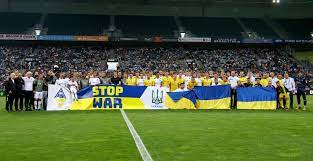October 6 – With UEFA’s executive committee having voted to let Russia’s U17 national teams back into international competition last week, the FIFA Council has now followed suit and extended this decision to cover the U-17 World Cup and FIFA U-17 Women’s World Cup.
Russia’s teams would qualify for the FIFA finals via UEFA’s competitions.
As per the UEFA ruling, Russian teams are required to play under the ‘Football Union of Russia’ name rather than ‘Russia’. There can be no display of the Russian flag or singing of the national anthem and national-team kit and equipment must be in neutral colours.
In FIFA’s decision the world governing body did not go into any lengthy defence of the re-admittance by talking of punishing children or invoking the spirit of the UN Convention on the Rights of the Child as justification.
But FIFA’s Council did condemn “Russia’s illegal war in Ukraine and confirmed that the remaining terms of the decision made on 28 February 2022 remain in force until the end of the conflict.”
Not surprisingly the decision by UEFA to allow Russia’s youth teams has provoked a backlash amongst European nations.
In a letter to FIFA, UEFA and UEFA’s member associations, the Ukrainian FA (UAF) called on European countries to boycott any matches against Russian teams.
Last week the UAF said 10 European nations had said they would not play Russian teams while others had written to UEFA requesting a fuller explanation of the decision. That boycott would obviously extend to FIFA competitions.
“The football associations of England, Poland, Latvia, Lithuania, Sweden, Denmark, Finland, Ireland, Norway, and Romania have already officially announced such a boycott. Several other countries – Switzerland, the Czech Republic, the Netherlands and Estonia – have announced that they are waiting for further explanations from UEFA. UEFA’s own reasoning dictates that its statutory objectives require the recent decision to be reversed,” said the UAF.
Addressing the use of the UN Convention on the Rights of the Child to justify the readmission the UAF said: “Since the beginning of the full-scale invasion, hundreds of children – from newborn to youngsters – have been killed, thousands have been injured and over 3000 crimes against children have been established, including cases of sexual abuse. At least 19,000 children have been kidnapped from Ukraine and taken to Russia; For those who have survived and remain, missiles and shells continue to fly over their heads, and children are forced to spend hours in cold underground bomb shelters and have precious little opportunity to enjoy the freedoms enjoyed by those in the Russian U-17 teams, who live and train in warm safe and peaceful cities.”
Yesterday a Russian attack on the village of Hroza, south-east of Kharkiv, killed at least 51 people attending a funeral, including an eight-year-old boy. That boy will not be playing any more football, or watching it.
What is unclear is FIFA and UEFA’s definition of ‘child’. Allowing the return of U17 players means that some 17 year olds could be playing. It is also likely that some of the Russians would have made first team debuts for their clubs.
Neither FIFA or UEFA polled their memberships before making the decision to re-admit. But their decision will without doubt go some way to masking the barbarity of Russia’s war on Ukraine – whether that decision was made for good reasons or not.
It is expected that the bulk of UEFA’s member nations will come out against the executive committee decision. Then it will be a case of seeing whether the iron fist of FIFA and UEFA democracy listen to their membership.
Contact the writer of this story at moc.l1745067353labto1745067353ofdlr1745067353owedi1745067353sni@n1745067353osloh1745067353cin.l1745067353uap1745067353

